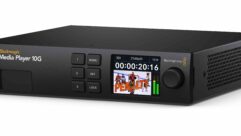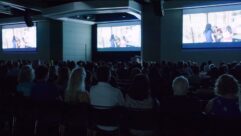More Volunteers Cope with Pressures of Church Media
May 4, 2006 8:00 AM
Today’s church technical directors are a different breed from their predecessors, according to Derick Hill of Clark Promedia. This change has had important repercussions for many churches coping with increasingly complex media systems.
“The biggest change I’ve seen over the years,” notes Hill, himself a former church technical director, “is that when I was a technical director, churches were really looking for the guy who pushed buttons better than anyone else. They were getting these really great people, but also finding that their volunteers were going down.
“Today,” he adds, “churches are really seeing the technical arts side of things as a ministry and not as a technical job. Where some churches fall down is when they think that guys who are really good at technical things will also be good at teaching.”
Teaching is key, Hill says, because even when a church has a full-time tech person on staff, the vast majority of the workload still falls on volunteers. “In 95 percent of our applications, every part of the system is run by a volunteer, even in the larger churches.”
These volunteers, in turn, cope with two seemingly contradictory trends that continue to shape the church media environment. While individual pieces of equipment keep getting easier to use, the total systems installed in many churches continue to gain complexity.
“The whole idea of video in the church today is becoming more and more complicated,” says consultant/designer Bill Schuerman. He cites wireless microphones as a technology “people can almost do themselves.” Even though individual mics, antennas, and receivers may be quite simple, he explains, many church buyers continue to add onto their systems with so many mismatched components they end up creating a disaster.
And in Schuerman’s view, the reliance on volunteer labor can lead to problems. “People can’t see the forest for the trees,” he says. In implementing a complex high-end audio system, he comments, “They’re looking at a major, major expense, they want it to work right, but they’re not willing to hire people to make it run right.”
On jobs he designs, Schuerman says he requires the AV contractor to provide training to the owner, and often staffs the first service or two, just to be sure everything is running correctly. Initial training is videotaped so that later recruits can have the same introduction to the system.
When it comes to training volunteers, simplicity and thoroughness are the keys, says Hill. “Almost all of our clients will do a volunteer boot camp, and in some cases, it’s actually a requirement of being involved in their tech ministry. They want to sharpen people’s skills as operators, but they really want them to capture the vision of what the church is trying to accomplish.”
Although manufacturers can and do contribute to volunteer training, Hill feels it’s really chiefly the integrator’s responsibility. It’s also important to return periodically to deliver refresher training to long-term volunteers and initial training for newcomers. That’s especially true when a church has built a new building.
“The media ministry group may grow five times in the first six months,” Hill says. Clark Pro Media also encourages various networking strategies that enable church personnel to learn from their more experienced peers at other churches.










